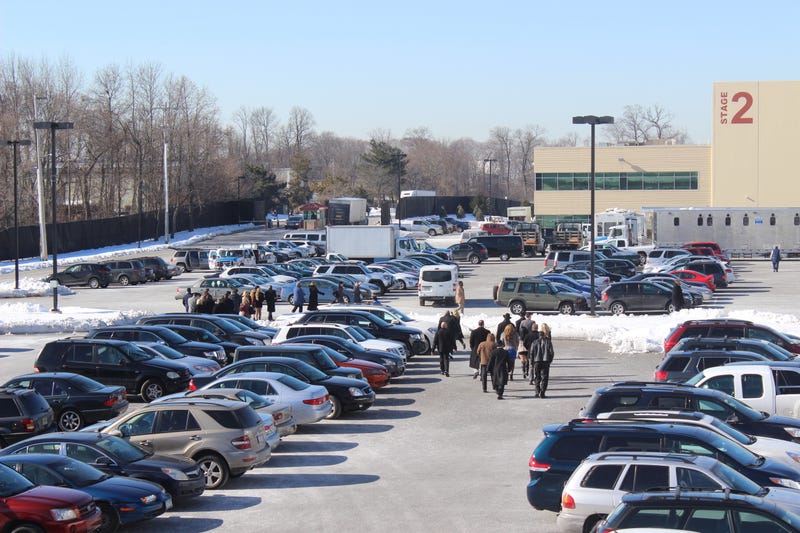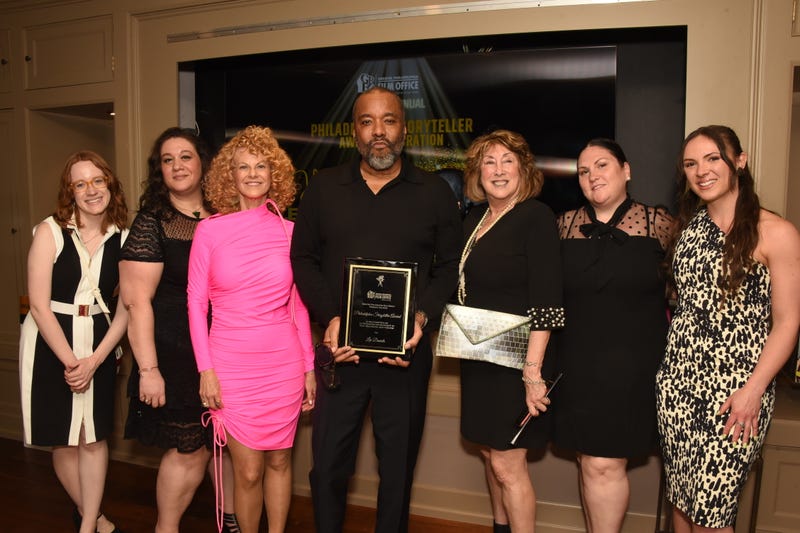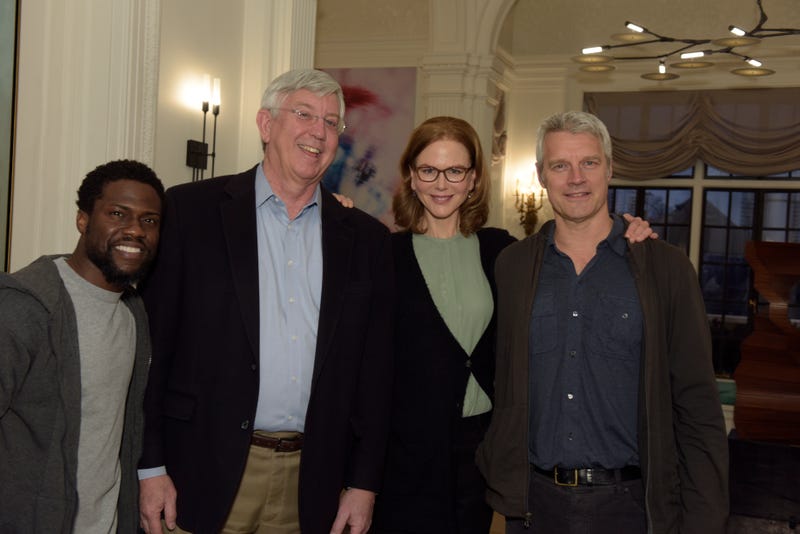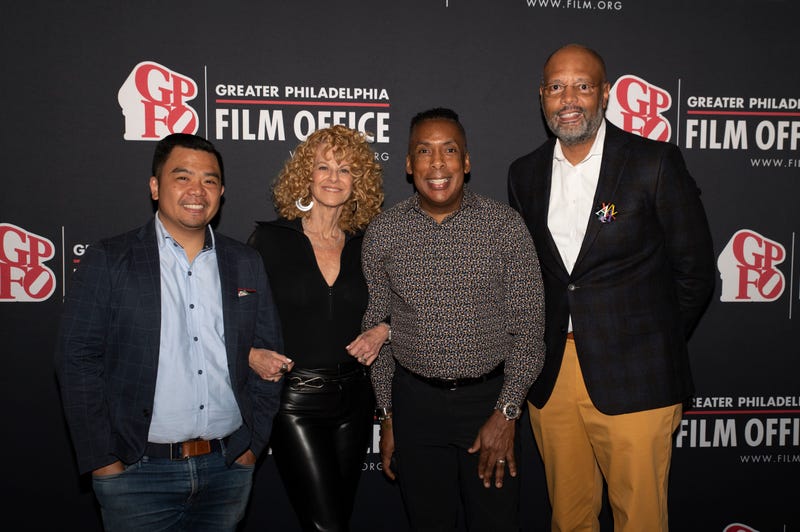
KYW Newsradio is taking a look at Philadelphia’s entertainment scenes this week with a series of special reports called “The State of Entertainment.” The focus today is on the economic impact of movie and TV production.
🎧 Listen to the Feb. 15, 2024, special broadcast "Streaming Wars: The End of Content's Golden Age?"
PHILADELPHIA (KYW Newsradio) — While Philadelphia is far from the movie capital of the world, it has a viable film and TV industry with a significant economic impact.
The Greater Philadelphia Film Office, which supports and facilitates productions in southeastern Pennsylvania, says the industry has generated more than $6 billion since it started more than three decades ago.
“People think, ‘Oh, yeah, they're making movies.’ [But] this is a big business,” said Sharon Pinkenson, executive director of GPFO. “And the impact to the region is enormous.”
That impact totaled more than $476 million in the 2021-2022 fiscal year, with the bulk coming from projects originating outside of Philly that sustain a machine of moving parts, from actors and crews to sets and wardrobe.
But there are also jobs many don't usually consider, including police officers and signage makers.
“There's pyrotechnics permits and the Streets Department,” Pinkenson added. “We have to get street closures through the city that we coordinate, and we have to get trash and recycling pickups. It's an army.”
And that army has to be fueled.
“There's coffee shops when you're near a set and those coffee shops get a bonanza. While [production is] going on, everybody wants a great coffee place.”
And as Jeffrey Rotwitt, president of Sun Center Studios in Aston tells us, that army also has to be fed and housed.
“The production not only spends money on the actors and the crew that are here, but they house people in hotels, they’re going to restaurants to eat. Catering has a big function here,” he said.

Rotwitt opened Sun Center Studios in 2011. It’s the state's biggest production facility, hosting one or two major productions in a given year.
“Assuming there are no unique events, like pandemics, or industry strikes, they're here anywhere from a minimum of four months to eight or nine,” he said.
Past projects shot on their soundstages include the first two “Creed” movies, HBO’s “Mare of Easttown,” and several M. Night Shyamalan movies, including “After Earth,” “The Visit,” “Split” and “Knock at the Cabin.”
Jason Loftus, owner of Heery-Loftus Casting, says his Philadelphia office handles about one or two film and TV projects and around 100 to 125 commercials each year. One major TV series his agency worked on was “Mare of Easttown,” casting nearly 80 actors with speaking parts, including recurring roles and guest stars.
“We’re a lot different than a casting director who works just in L.A. or New York,” Loftus said.
“Our job is a little bit more about finding people in the environment they live in, because if we're doing a television show that, say, is about Delco and whatever is going on, they want us to find people from that world.”
Heery-Loftus sees thousands of actors each year, and many of them are new to the business.
“We're often their very first access,” he said. “When they're trying to be an actor, they don't know anything yet. So a lot of times, we're dealing with a lot of people who, honestly, it's their first job, it's their first audition.”
But Loftus and other Philly casting agents also see many experienced working actors from this area, like Bryan Donoghue.

Donoghue has spent more than two decades landing everything from acting roles to production jobs all over the country — but he says about 60-70% of his work is in Philadelphia.
“I mean, we've got a lot of stuff. If you're hungry and you keep looking, you keep grinding,” he said. Donoghue’s grind has included supporting roles in independent films, small parts in TV shows, commercial leads, production design and directing, stand-up comedy and even birthday parties.
“I was a performer for little kids’ birthday parties for many, many years. That always, you know, kept me acting. Then, once the roles got in, my agent Mary Anne Claro kept me working constantly. I was always over at Philadelphia Casting or Mike Lemon, or with Linda Wisch or Kathy Wickline, one of the casting places in Philly every other week at least.”
For Donoghue, there are major benefits to working in Philadelphia, like collaborating with familiar faces.
“If I'm production designing something here in Philly, as opposed to Los Angeles, I have all of my tools here in Philly, all of my resources, all of my people.”
But perhaps the best part is seeing a particular set of faces at the end of each day.
“I get to go home every night, whereas in L.A., FaceTiming with your family is a lot different than having dinner with them and being on a three-hour schedule,” he said.
With the strikes behind us, many in the local film community are optimistic about the future — but cautiously so.
Hollywood strikes ripple through Philly
Last year’s Writers Guild and SAG-AFTRA strikes cost the region about $100 million in revenue, according to film office data, and forced Donoghue to postpone his wedding.
“A lot of money was missing, and weddings are expensive. I mean, throwing a big party for, like, 200-300 people? Well, you need some money for that,” he said.
However, independent filmmaker Chris Pierdomenico found a silver lining as he prepared to shoot his feature film, "Delco: The Movie." He technically didn’t need to halt production because of an independent film exemption, but he says the delay was actually useful.
“It helped our team have more time to make the movie better,” he said. “It gave our art department more time to work on getting period-era props and costumes situated. It gave me more time to make script revisions, and overall have much higher quality products.”
Pierdomenico’s movie is a love letter to his home of Delaware County. He launched a successful crowdfunding campaign to raise money for production and the filmmaker — who works by day as a high school teacher — says he’s overwhelmed by how much his community has rallied to support him.
“It's been very, very heartwarming and humbling,” he said. “It makes sense that people would rally around it because I think everybody from this area kind of sees themselves in that. Even if they don't know what the story is, everybody can relate to that in some way.”

With the strikes behind us, many in the local film community are optimistic about the future — but cautiously so.
“We've been mobbed,” Loftus said. “We have two major studio productions. We've done multiple independent films. We've got a couple of those starting in the spring. We've been very, very busy, but from what I understand, talking to our colleagues, there's been a contraction in the business. Whereas there was a massive boom in streaming … the industry has gotten a little bit smaller, because now studios are picking quality over quantity. That seems to be what's happening.”
Still, he says there’s always going to be a demand for new film and television content.
“I think it's going to be consistent. It just may not be the booming explosion we were having for a while,” Loftus said.
But, according to Pinkenson, that positive outlook depends on whether Pennsylvania continues to boost tax incentives for productions. The credits are slated to be capped at $100 million until 2025 based on 2022 legislation that upped the program from $70 million.
“So many more jobs could be created if we had more tax credits,” Pinkenson said.
Rotwitt says those film tax credits are not only essential to attracting productions, but also keeping workers in the area.
“The program not only provides high-paying jobs, but it also provides a way to try to keep some of the best and brightest of our college graduates who want to go into this industry from leaving Pennsylvania to go to New York or L.A.,” he said.
“So it's trying to keep some of them here, as well as employing a lot of people who are basically blue-collar union jobs, as well as the high-tech people who are involved with the digital aspects of it.”
And Pinkenson says conversations with the Shapiro administration have been encouraging.
“We're anxiously waiting for Gov. Shapiro's report on what he's going to do in the next fiscal year. Our hope is that we will get at least $200 million, hopefully $300 million — and we're talking about the whole state. Not the City of Philadelphia, but the entire state,” she said.
“If it's $100 million next year, there's only so much we can do. If we get a bigger tax credit from the state, then we'll have a lot more business.”

